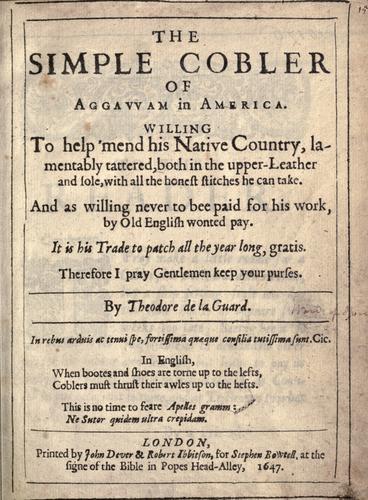 Ward is most famous for his second book, The Simple Cobler of Aggawam in America (1647). Published in England, this book is often cited as the first book of American humor (albeit a dark, satirical humor remeniscent of the Marprelate Tracts). Note that while the title page states the Cobbler is "of" Aggawam (the Indian name for Ipswich), England is nevertheless called his native country, even though Ward had been living in the New World for over a decade at the time of the book's publication. Note, too, that while he published anonymously under the appropriately named "Theodore de la Guard," Ward was generally known as the author. The Simple Cobler rails against the newest fashions, from women's immodest clothing to the spectre of religious toleration. According to Ward,
Ward is most famous for his second book, The Simple Cobler of Aggawam in America (1647). Published in England, this book is often cited as the first book of American humor (albeit a dark, satirical humor remeniscent of the Marprelate Tracts). Note that while the title page states the Cobbler is "of" Aggawam (the Indian name for Ipswich), England is nevertheless called his native country, even though Ward had been living in the New World for over a decade at the time of the book's publication. Note, too, that while he published anonymously under the appropriately named "Theodore de la Guard," Ward was generally known as the author. The Simple Cobler rails against the newest fashions, from women's immodest clothing to the spectre of religious toleration. According to Ward, "The power of all Religion and Ordinances, lies in their purity: their purity in their simplicity: then are mixtures pernicious. I lived in a City, where a Papist preached in one Church, a Lutheran in another, a Calvinist in a third; a Lutheran one part of the day, a Calvinist the other, in the same pulpit: the Religion of that place was but motley and meagre, their affections Leopard-like. . ."
In response to this "poly-piety," he grimly remarks "I dare take upon me, to bee the Herauld of New-England so farre, as to proclaime to the world, in the name of our Colony, that all Familists, Antinomians, Anabaptists, and other Enthusiasts shall have free liberty to keepe away from us, and such as will come to be gone as fast as they can, the sooner the better. . ."
Ward moved back to England in 1647 (after the book's publication). The book's title page shows the Simple Cobbler was printed for Stephen Bowtell, who also had printed Anne Bradstreet's The Tenth Muse Lately Sprung up in America (1650). Ward likely had a hand in the publication of The Tenth Muse, and one of his poems appears among the introductory verses; in it he refers to Bradstreet as a "right Du Bartas girl." (Guillaume de Salluste Du Bartas was a sixteenth-century French Huguenot poet and a significant influence on Bradstreet's early poetry.)
Ward did not approve of mistreating the King (and likely rejected regicide), and despite his literary celebrity as the Simple Cobbler, he settled into the ministry of a small English parish, going to his eternal reward in 1652.
No comments:
Post a Comment